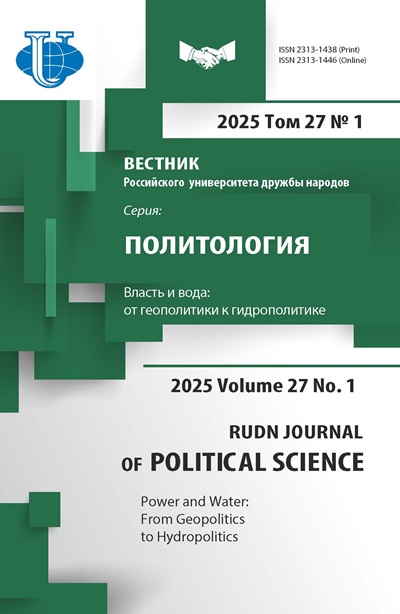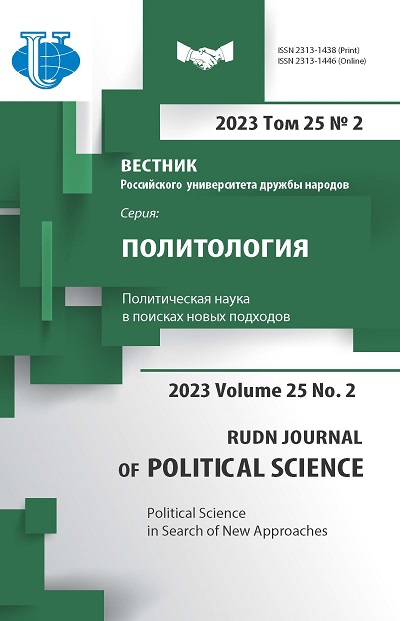“The Law of the Politics - When Creating Something New, One Should Rely on What Has Been Achieved, Not Diminish the Old”: for the 100th Anniversary of A.M. Kovalev
- Authors: Kovalenko V.I.1, Sobolev V.A.1
-
Affiliations:
- Lomonosov Moscow State University
- Issue: Vol 25, No 2 (2023): Political Science in Search of New Approaches
- Pages: 330-347
- Section: IN SEARCH OF THE THEORETICAL FRAMEWORK OF THE POLITICAL
- URL: https://journals.rudn.ru/political-science/article/view/35154
- DOI: https://doi.org/10.22363/2313-1438-2023-25-2-330-347
- EDN: https://elibrary.ru/YCVBHC
Cite item
Full Text
Abstract
The study analyzes the contribution of Alexander Kovalev to science and education, who stood at the origins of political science since its institutionalization in Russia. The contours of his general political and philosophical concept of social development are determined, original approaches to the interpretation of the categories “power” and “politics”, the laws of politics and political activity, and a number of basic concepts of political science are reconstructed. The role of A. Kovalev in substantiating the importance of political science, its structure and its place in the system of social and humanitarian sciences is highlighted. His persistent desire to establish the foundations of politics with the way of production of public life is noted and thereby more fully highlight the ideological and methodological aspects of political science knowledge, to link the philosophy and theory of political science with the variety of its instrumental dimensions. A. Kovalev’s interpretation of the problem of interrelation and interdependence of system-wide and individual needs and interests in public life, natural and spontaneous in the political process, the importance of the moral principle in politics is revealed. The question is raised about his development of the problem of the correlation of natural and social, the dialectics of civilizational and formational in social development, the correlation of innovations and traditions in political life, the scientific responsibility of a political scientist. Particular attention is paid to the qualities of A. Kovalev as an organizer of science, teacher and mentor, who educated many dozens and even hundreds of political scientists who confidently took their place in the formation and development of political science in the country. It is emphasized that the scientific merits of A. Kovalev are inseparable from his highly moral civil position, responsibility for the fate of the Motherland.
About the authors
Valery I. Kovalenko
Lomonosov Moscow State University
Author for correspondence.
Email: kovalenko1946@list.ru
ORCID iD: 0000-0002-4430-0377
Doctor of Philosophy, Professor, Head of the Department of Russian Politics, Faculty of Political Science
Moscow, Russian FederationVladimir A. Sobolev
Lomonosov Moscow State University
Email: sobolev@polit.msu.ru
ORCID iD: 0000-0001-7013-8070
Candidate of Political Science, Associate Professor of the Department of History and Theory of Politics, Faculty of Political Science
Moscow, Russian FederationReferences
- Alekseeva, T.A. (2005). Perception and essence of the political. Politeia — The Journal of Political Theory, Political Philosophy and Sociology of Politics, (1), 144–170. (In Russian). https://doi.org/10.30570/2078-5089-2005-36-1-144-170
- Ahvlediani, A.A., & Kovalev, A.M. (1996). Property, power, politics. Moscow: Moscow University Press. (In Russian).
- Batalov, E.Ya. (2005). The ascent to political science. Social sciences and contemporary world, (3), 34–47. (In Russian).
- Boitsova, O.Yu. (2018). The power as a concept: fixing the meanings in the language and their interpretation in modern political philosophy. Bulletin of Moscow University. Series 7. Philosophy, (1), 55–62. (In Russian).
- Brown, А.Н. (1984). Political science in the Soviet Union: a new stage of development? Soviet Studies, 36(3), 317–344. https://doi.org/10.1080/09668138408411537
- Brown, A.H. (1986). Political science in the USSR. International Political Science Review, 7(4), 443–481. https://doi.org/10.1177/019251218600700408
- Brown, А.Н. (1974). Soviet politics and political science. London: Macmillan. https://doi.org/10.1007/978-1-349-01567-2
- Burenko, V.I. (2019). About the beginning and origins of modern Russian political science (30 years of Russian political science). PolitBook, (3), 164–179. (In Russian).
- Galkin, A.A. (2010). At outset of political science resurrection in Russia (1960–1985). Personal considerations. Politeia — The Journal of Political Theory, Political Philosophy and Sociology of Politics, (3–4), 257–269. (In Russian). https://doi.org/10.30570/2078-5089-2010-5859-3-257-269
- Galkin, A.A. (2013). Power and political capital considerations at leisure. Politeia — The Journal of Political Theory, Political Philosophy and Sociology of Politics, (4), 6–22. (In Russian). https://doi.org/10.30570/2078-5089-2013-71-4-6-22
- Glebova, I.I. (2009). Sacralization of supreme authority in Russia as a cultural and historical phenomenon. Russia and the contemporary world, (4), 23–43. (In Russian).
- Gutorov, V.A. (2016). On some aspects of the formation of political philosophic discourse in modern Russia. POLITEX: Political Expertise, 12(1), 4–28. (In Russian).
- Gutorov, V.A. (2015). Politics and education: historical tradition and modern transformations. Polis. Political Studies, (1), 9–29. (In Russian). https://doi.org/10.17976/jpps/2015.01.02
- Gutorov, V.A., & Shirinyants, A.A. (2021). Interpretation of communism and post-communist transformations in Russia: modern theoretical discussions. RUDN Journal of Political Science, 23(4), 525–544. (In Russian). https://doi.org/10.22363/2313-1438-2021-23-4-525-544
- Hill, R.J. (1980). Soviet politics, political science and reform. New-York: M.E. Sharpe. https://doi.org/10.1177/000271628145300138
- Ilyin, M.V. (2001). Russian political science: understanding of tradition. Political Science, (1), 5–21. (In Russian).
- Ilyin, M.V., & Koval, B.I. (1991). What is politics and what is the science of politics (the experience of an unconventional review). Polis. Political Studies, (4), 103–115. (In Russian).
- In memory of Alexander Kovalev. (2010). Bulletin of Moscow University. Series 12. Political Science, (6), 106–107. (In Russian).
- Irhin, Yu.V. (2011). Russian political science: stages of genesis and features of institutionalization. Central Russian Journal of Social Sciences, (1), 94–102. (In Russian).
- Kapto, A.S. (2018). On the question of institutionalizing political science. Social and humanitarian knowledge, (2), 67–77. (In Russian).
- Kovalenko, V.I. (2013). In memory of the teacher. In A.M. Kovalev, Selected works. Memories of A.M. Kovalev (pp. 522–528). Moscow: Moscow University Press. (In Russian).
- Kovalenko, V.I. (2009). Political science and political science education in Russia and in MSU. Bulletin of Moscow University. Series 12. Political Science, (1), 4–9. (In Russian).
- Kovalev, A.M. (2005). Socially just society — utopia or possibility. Moscow: Contemporary notebooks. (In Russian).
- Kozikov, I.A., & Kudryashova, M.S., & Shutov, A.Yu. (2013). Scientist, teacher, citizen. In A.M. Kovalev, Selected works. Memories of A.M. Kovalev (pp. 7–14). Moscow: Moscow University Press. (In Russian).
- Malcolm, N. (1984). Soviet political scientists & American, politics. New-York: St. Martin’s Press. https://doi.org/10.1007/978-1-349-17434-8
- Pivovarov, Yu.S. (2001). Political science in the information system. Political Science, (1), 49–53. (In Russian).
- Plyais, Ya.A. (2005). About genesis, subject and contemporary situation in Russian political science. Bulletin of Moscow University. Series 12. Political Science, (1), 9–32. (In Russian).
- Plyais, Ya.A. (2001). Political power as the main subject of political science in the transitional society. Bulletin of the Financial Academy, (3), 47–57. (In Russian).
- Shabrov, O.F. (2016). The concept of political: is political science possible? The Authority, 24(9), 51–61. (In Russian).
- Shutov, A.Yu. & Sobolev, V.A. (2020). Formation of political science in the USSR: To the 30th anniversary of official recognition. Dialogue with Time, (71), 28–38. (In Russian). https://doi.org/10.21267/AQUILO.2020.71.63584
- Skilling, G. (1963). In search of political science in the USSR. The Canadian Journal of Economics and Political Science, 29(4), 519–529. https://doi.org/10.2307/139341
- Smorgunov, L.V. (2015). Regional political science communities in the Soviet era. Political Science, (3), 125–137. (In Russian).
- Sobolev, V.A. (2019). F.M. Burlatsky (1927–2014). Life and works. The formation of political science in the USSR. Moscow: Moscow University Press. (In Russian).
- Sobolev, V.A. (2022). History of political science in Russian. Moscow: Moscow University Press. (In Russian).
- Sobolev, V.A. (2020). Significance of the ideological and theoretical heritage of A.M. Kovalev for the formation of political science in Russia. The Caspian Region: Politics, Economics, Culture, 2(63), 136–141. (In Russian).
- Sobolev, V.A., & Filimonov, K.G. (2022). The Soviet political science tradition in universities:
- politics and political science in the works of A.M. Kovalev. Tomsk State University Journal, (474), 161–168. (In Russian). https://doi.org/10.17223/15617793/474/18
- Sobolev, V.A., & Shirinyants, A.A. (2016). F.M. Burlatsky and formation of political science in the USSR. Political Science, Special issue, 25–42. (In Russian).
- Soloviev, A.I. (1998). Political power in the review of Russian scientists. Bulletin of Moscow University. Series 12. Political Science, (4), 21–39. (In Russian).
- Soloviev, A.I. (2020). Power and politics. Polemic notes about “damned questions” of political science. Polis. Political Studies, (6), 135–147. (In Russian). https://doi.org/10.17976/ jpps/2020.06.10
- Soloviev, A.I. (1997). Power in the political dimension. Bulletin of Moscow University. Series 12. Political Science, (6), 57–70. (In Russian).
- Theen, R.H.W. (1971). Political science in the USSR: “To be, or not to be” Some reflections on the implications of a recent Soviet critique of American political science. World Politics, 23(4), 684–703. https://doi.org/10.2307/2009856
- Tsaregorodtsev, S.S., & Shirinyants, A.A. (2018). In search of meaning: ideas as a factor of policy. Bulletin of Russian nation, (1), 64–78. (In Russian).
- Vorobyev, D.M. (2004). Political science in the USSR: formation and development of a scientific community. Polis. Political Studies, (4), 169–178. (In Russian). https://doi.org/10.17976/jpps/2004.04.14
















